Lehigh Valley charter schools are dipping into fund balances and drawing on credit lines to cover lost revenues as sending school districts withhold tuition payments during the state budget impasse.
School leaders from brick-and-mortar and cyber charters that operate in the Lehigh Valley say they understand that school districts are under strain; however, without the power to collect local taxes, the charters have been left with few options to replace lost revenue from districts.
“We are in the fortunate position of being able to weather this storm in the short term,” Arts Academy Charter Middle School Executive Director Karl Eisenhart said in an email. “If the situation continues into the winter, we may have to make some tough decisions with regard to staffing, facilities, and programs. This will put added stress on our fantastic staff and will compromise how we are able to serve our students.”
Students at Arts Academy Charter Middle School change for classes on Thursday, Oct. 30, 2025, in Salisbury Township. A growing number of Lehigh Valley school districts are withholding payments to charter schools like Arts Academy during the ongoing state budget impasse. (Jane Therese/Special to The Morning Call)

Students at Arts Academy Charter Middle School change for classes on Thursday, Oct. 30, 2025, in Salisbury Township. A growing number of Lehigh Valley school districts are withholding payments to charter schools like Arts Academy during the ongoing state budget impasse. (Jane Therese/Special to The Morning Call)
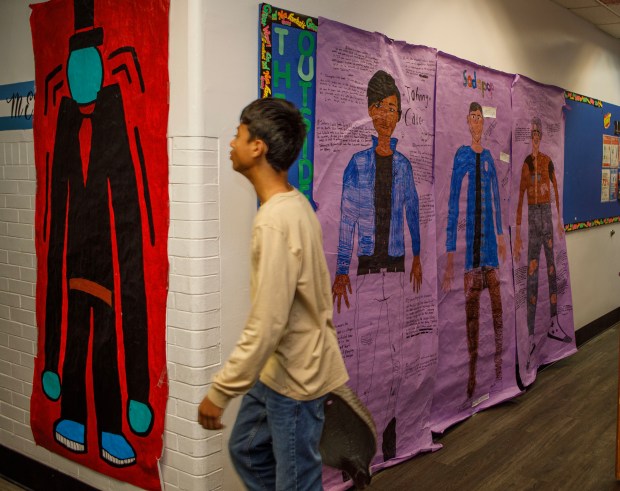
Students at Arts Academy Charter Middle School change for classes on Thursday, Oct. 30, 2025, in Salisbury Township. A growing number of Lehigh Valley school districts are withholding payments to charter schools like Arts Academy during the ongoing state budget impasse. (Jane Therese/Special to The Morning Call)
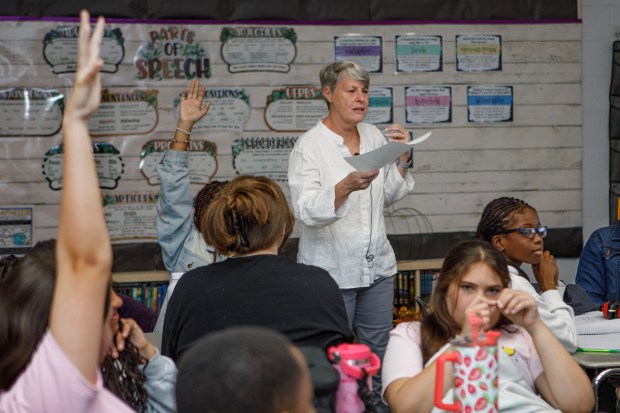
Sixth grade students in Amy Recke’s class answer questions at Arts Academy Charter Middle School on Thursday, Oct. 30, 2025, in Salisbury Township. A growing number of Lehigh Valley school districts are withholding payments to charter schools like Arts Academy during the ongoing state budget impasse. (Jane Therese/Special to The Morning Call)
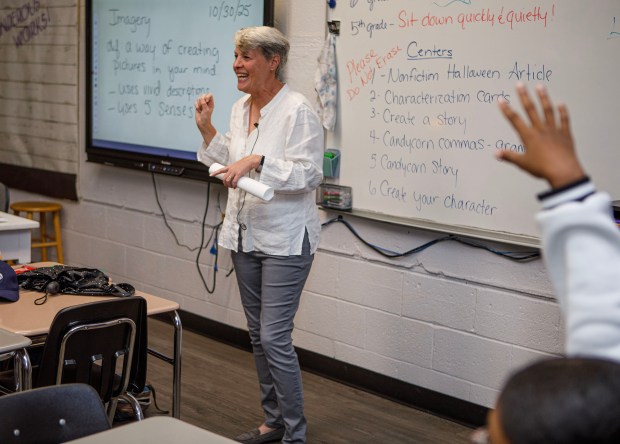
Sixth grade teacher Amy Recke at Arts Academy Charter Middle School on Thursday, Oct. 30, 2025, in Salisbury Township. A growing number of Lehigh Valley school districts are withholding payments to charter schools like Arts Academy during the ongoing state budget impasse. (Jane Therese/Special to The Morning Call)

Students at Arts Academy Charter Middle School work on their art posters on Thursday, Oct. 30, 2025, in Salisbury Township. A growing number of Lehigh Valley school districts are withholding payments to charter schools like Arts Academy during the ongoing state budget impasse. (Jane Therese/Special to The Morning Call)
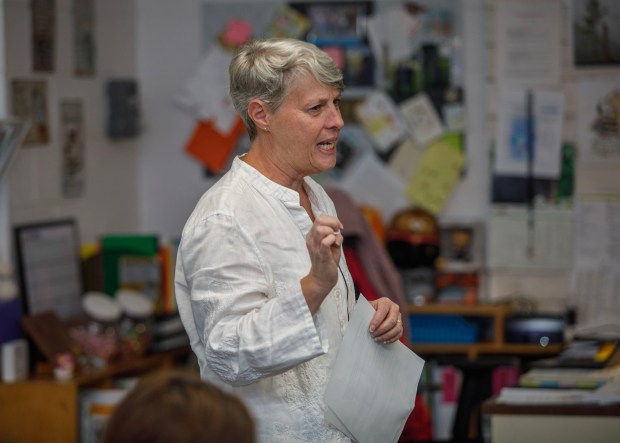
Sixth grade teacher Amy Recke at Arts Academy Charter Middle School on Thursday, Oct. 30, 2025, in Salisbury Township. A growing number of Lehigh Valley school districts are withholding payments to charter schools like Arts Academy during the ongoing state budget impasse. (Jane Therese/Special to The Morning Call)
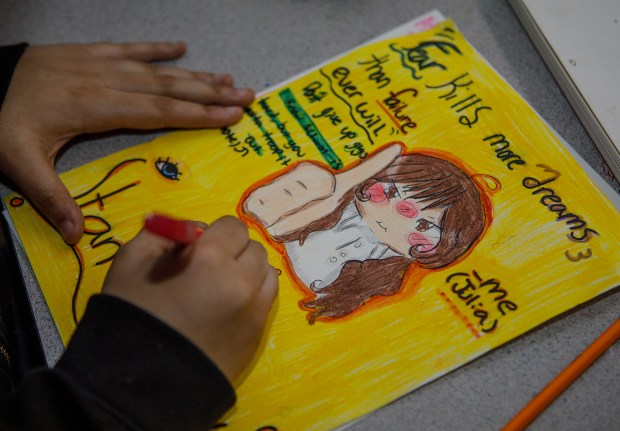
A student at Arts Academy Charter Middle School works on her art poster on Thursday, Oct. 30, 2025, in Salisbury Township. A growing number of Lehigh Valley school districts are withholding payments to charter schools like Arts Academy during the ongoing state budget impasse. (Jane Therese/Special to The Morning Call)
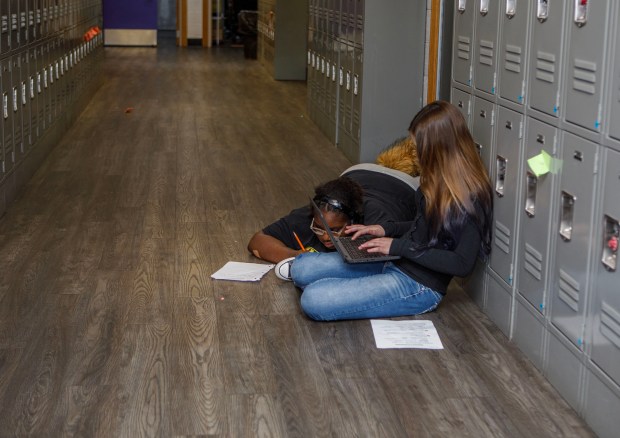
Students work on their assignments at Arts Academy Charter Middle School on Thursday, Oct. 30, 2025, in Salisbury Township. A growing number of Lehigh Valley school districts are withholding payments to charter schools like Arts Academy during the ongoing state budget impasse. (Jane Therese/Special to The Morning Call)
Show Caption
1 of 9
Students at Arts Academy Charter Middle School change for classes on Thursday, Oct. 30, 2025, in Salisbury Township. A growing number of Lehigh Valley school districts are withholding payments to charter schools like Arts Academy during the ongoing state budget impasse. (Jane Therese/Special to The Morning Call)
Resolutions that withhold all or part of the tuition payments school districts pay to charters that serve students from their district have passed across the state in recent weeks.
Bethlehem Area School District led the trend in the Lehigh Valley, passing a resolution in late September to withhold 30% of the payments it makes to charter schools until the state budget passes. That percentage matches the portion of funding the district receives from the state.
The majority of Lehigh Valley districts that have passed similar resolutions followed Bethlehem’s model. Salisbury Township will withhold 21% of its payments, Allentown will withhold 40% and Northwestern Lehigh will withhold 29%.
Other districts have gone further, with Northern Lehigh and Parkland voting to withhold 100% of charter school payments.
All the resolutions are designed to be temporary, with districts pledging to send the money after state funds are unfrozen.
Leaders from both school districts and charters have noted that these resolutions are not authorized by the state’s School Code.
It’s only reasonable that charter schools share in the public service sector’s pain, said Alyssa Mace, CEO of Roberto Clemente Charter School in Allentown, adding that she sees a large distinction between districts that are withholding partial payments and those that are stopping payments altogether.
“Most of the school districts that issue tuition payments for Roberto Clemente Charter School students have reduced their payments by a percentage and have provided sufficient communication that this reduction is temporary. RCCS appreciates this position, especially from the Allentown School District, as it demonstrates consideration for charter school law,” Mace said in an email.
“However, for the school districts that are withholding 100% of charter school tuition payments, this position is illegal and has the potential to directly and detrimentally impact students and their learning.”
Roberto Clemente draws 96% of its students from Allentown School District. The school has a line of credit designed to meet payment obligations during a budget impasse and its board of trustees designates a portion of its general funds for that purpose.
Avoiding service cuts
If the majority of districts continue to withhold partial payments, the financial hit would be manageable, said Robert Lysek, founder and CEO of Executive Education Academy Charter School.
Cost-saving steps could include delaying vendor payments, Lysek said, but that action is still just a hypothetical as the school holds reserves designed to weather three to six months of financial hardship. The charter also has a revolving credit line it can draw on if necessary.
Large school districts have much more to deal with financially than individual charters do, Lysek said, adding that he understands that districts feel compelled to pass on some of the costs they’re incurring during the budget impasse.
“I wouldn’t personally do that, but that’s their decision if they think it’s best for their district,” Lysek said. “I know they’re going to look after the district first, but as long as our students are still protected, and we’re receiving enough to function, we’re not that upset about it.”
Most of the charter school leaders who spoke to The Morning Call said they couldn’t yet estimate how much revenue they might lose as resolutions withholding various levels of payment continue to pass in the various districts they draw from.
Agora Cyber Charter School has run those calculations already, estimating that their loss of monthly revenue is approaching $3.5 million. That number encompasses withheld payments from all districts statewide that send students to the cybercharter.
The school serves 4,300 students. Its 64 Lehigh Valley students are spread across 10 districts, with roughly half coming from Allentown.
Agora Cyber Charter School has a $95 million annual operating budget, and 95% of its funding comes from school districts.
Although cybercharters don’t share all the operating costs that brick-and-mortar schools incur, their budgets look similar, Agora CEO Rich Jensen said. Expenses include central office functions such as the business, human resources and technology departments.
Agora teachers are compensated for running school clubs. The cybercharter employs counselors and staffs nurses who perform immunizations and health checks. It also pays for some positions unique to cybercharters, such as family coaches who serve as points of contact for specific geographic areas.
Students come to Agora when their district placement is not working, Jensen said. Some are failing academically while others don’t feel safe traveling to their local school.
While cybercharters are sometimes used as “triage centers” where students go for a year or two to get back on track, an increasing number of students stay through graduation. The option isn’t for everyone, but it should remain available to those who need it, Jensen said.
“I would not want to pit one group over another,” Jensen said. “I think we’re all feeling the pain.”
If district payments cease at the same time the budget impasse has frozen state funds and the government shutdown has cut off federal funds, charters will have no revenue streams left, said Beth Jones, interim CEO of Insight PA Cyber Charter School.
The cybercharter has 2,900 students, including 125 from Lehigh Valley districts. About 30% of its students come from Philadelphia, and that district has not cut tuition payments.
“Sometimes charters and cybercharters take some heat from the media and from traditional public school districts that we have fund balances, but this is a perfect example of why we need it,” Jones said.

